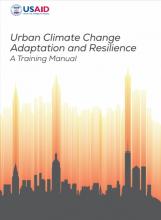Urban Climate Change Adaptation and Resilience – A Training Manual
Responding to regional capacity building needs, including a lack of urban-related climate change trainings available, USAID Adapt Asia-Pacific in 2014 developed an Urban Climate Change Adaptation and Resilience (UCCAR) training course. Developed in collaboration with the East-West Center at the University of Hawaii, the course aims to improve climate change knowledge among mid- to senior-level managers working in urban and infrastructure planning and, in turn, help them design better adaptation projects.This seven-module, five-day course starts with an introduction to climate change and climate change adaptation; provides tools and techniques for assessing climate change impacts and vulnerabilities; presents a framework for identification, evaluation, selection, and implementation of climate adaptation strategies, programs and projects; and finally looks at the options available for financing adaptation projects and methods of accessing climate change finance.A hallmark of USAID Adapt Asia-Pacific’s standalone capacity building programs is to ensure knowledge is tested and applicable in the real world. The UCCAR training course, therefore, incorporates multiple case studies, tools, methodologies, and guidelines developed through USAID Adapt Asia-Pacific’s engagement with national and local governments in preparing climate change adaptation projects.The training manual is primarily targeted at training institutions and agencies loking to develop and deliver urban climate change adaptation project development and finance training. The materials may also be useful for practitioners and individuals working in related sectors looking for a comprehensive set of tools and how-to guides for urban climate change adaptation.The manual outlines the course objectives and provides an overview of the modules, course theory and background, information on how the local implementer should prepare/modify the materials before the training begins, the estimated time required for each module, information on materials and facilities needed for implementation, pre- and post- test questions and further resources. Downloads of detailed course materials and notes for facilitators are provided under the further Resources section below.
Files
Document Tabs

